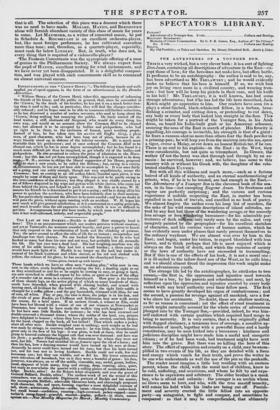THE LAST or rim Joennis.—Buckle is dead ! How strangely
local is fame ! This is an announcement which our readers perceive without emotion ; and yet at Tattersall's the sentence sounded heavily, and gave a quiver to hearts that only respond to the reverberation of hoofs and the chinking of guineas. Yes; the news seemed to affect the odds of life for an instant; sweepstakes and handicaps lost their charms. No one backed the favourite; for he who had backed so many had done his race and not won, but probably lost all, assuredly his life. His last race was a dead heat. His last weighing-machine was the arms of his sable bearers ; they had but a small burden; a three years' old would have made light of it. Buckle is no longer on the turf, but under it instead of his black waistcoat and white sleeves, or his red vest slashed with yellow, the colours of his glory, he has assumed the churchyard livery— .
"Grass-green, turned up with brown."
Those hands which we have so often seen "making play," whip now in one, now in the other, nicely handling and working the bit; a dazzling sight to see as they scintillated to and fro as he might be coming in easy, or going it hard, are now stretched in stiffened repose by his sides, as quiet as those of the effigy of a crusader cut in stone in a country churchyard. How poor is the fortune of those shandy legs, on the active plying of which so many hundreds of thou- sands have depended, when greaved with shining leather, and armed with lancing steel, all brilliant for the battle ! Alas, alas! the tight little saddle is changed for a coffin pillow ; and the gay horsecloth, trimmed with blue, fur one of cere, all white. Play or pay, the race is done, the judge is in his box, and the rivals of poor Buckle, ye Chiffneys and Robinsons, may now walk across the course, for a brief space. If an ancient Greek, a winner at Elis, could have been but blessed with a vision of one of our winners at Newmarket or Doncaster, how would he have made the welkin ring with laughter ! Could he but have seen little Buckle, for instance; he who has been crowned and double-crowned a thousand times ; whom the nobles of the land, yea, princes have delighted to honour ; whom they have gloried in, coveted, courted, shaken
. by the hand, clapped on the hack, all but bribed ! That which makes a jockey
mars all other men. Buckle weighed next to nothing; such weight as he had was made by strings, in courtesy called muscle : he was little, to dwarfishness great only in the bow of his legs : it was plain, to look at them, that he could grasp in femoral embrace the biggest colt that was ever dammed: and here was his forte ; a perfect Flibbertygibbet, his dimensions lay where they were not seen, but felt. Nature had moulded his os femoris upon the rib of a horse ; and then his feet, how a dancing-master would have turned up his nose at them !
• Assuredly he never could have turned out his toes; but then his heels turned
out, and his toes met in loving kindness. Buckle could not walk, few real horsemen can; but they can waddle, and so did he. His lower extremities were ridiculous off horseback, but on it they were a bootsful of grace : his face, however, was always, on or off the saddle, venerable, nay, awful, gaunt, hollow, lined, eloquent of trials many, long and strong, deep, cunning, alive, quiet, but ready to overwhelm the qnerist with a rolling glance of unutterable know- ledge. Buckle, adieu! As Sir Robert Adair eloquently, said over the grave of General Belliard, Buckle, adieu! The earliest work of art the writer of this remembers, was an admirablehtonish portrait of Buckle and his master, the incomparable Mellish; admirable likenesses both, and charmingly pregnant with character, life, and sport, forming together a most delightful contrast of tall, short—aristocratic, plebeian—noble, mean—thorough-bred, under-bred, but small boned--confidence, cunning—high-crowned, joekey-capped—mus- tacNo'd, smug-lipped—graceful, stunted—poplar, pollard—in short, nature against art.—New Monthly Magazine for March; Monthly Commentary.


























 Previous page
Previous page